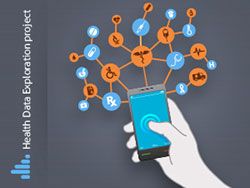Health Data Exploration Survey Seeks Participants Who Self-Track Health
By:
- Tiffany Fox
Published Date
By:
- Tiffany Fox
Share This:
Article Content

The Health Data Exploration project has announced a call for participants in an online survey that seeks to uncover insights into how individuals, companies and researchers are using the data that are captured through digital devices such as fitness apps.
Another goal of the survey is to determine how willing individuals are to share their digitally captured health data with others for research purposes.
This initiative – housed at the California Institute for Telecommunications and Information Technology (Calit2) and supported by the Robert Wood Johnson Foundation (RWJF) – will explore how new technologies like smartphones and digital apps are yielding an increasingly large amount of data that can be mined for insights into individual and population health and well-being.
“The future of personal health and how healthcare will be provided is poised to be radically transformed by these new technologies,” said Larry Smarr, director of Calit2 and a member of the Health Data Exploration (HDE) advisory board. “It’s important to set the stage now for how this will happen so that researchers from disciplines ranging from computer science to systems biology to exercise science can contribute their best efforts to help make this happen.”
Self-tracking devices and other technologies that generate “digital footprints” now make it possible for individuals, patients, providers and researchers to generate and access an abundance of health-related data. Until now, no large-scale survey has been conducted to determine how supportive these populations are to opening up and sharing these data for purposes of research.
The initiative also seeks a better understanding of current barriers preventing this type of data from being used in research – such as data quality, privacy and confidentiality.
Stephen J. Downs, chief technology and information officer of RWJF, says he and his collaborators at Calit2 are “hoping to hear from people who use smartphone apps or wearable devices to track different health-related variables like fitness, meals, sleep and mood and from representatives of the companies that provide those apps and devices."
According to a report released earlier this year by the Pew Internet Project, 69 percent of Americans track some kind of health data, and many researchers and medical practitioners believe these data could revolutionize how health is promoted, how care is provided and how individuals can become more confident in managing their health and wellness needs.
The HDE survey consists of 15-20 questions and requires fewer than 20 minutes to complete. Questions differ depending on how the participant self-identifies: As an individual, company representative or academic researcher. Individuals are asked under what conditions they might share their self-tracked data, for example, while researchers are asked if there are institutional barriers that would stop them from using self-tracked health data if they were offered from companies or individuals. Although most questions require only “yes” or “no” responses, some request additional (optional) comments.
Participants in the survey can remain anonymous, and the results of the survey will be made available in summary by the end of this year on the HDE website.
“We seek information and input from a range of academic disciplines -- from health services researchers, to those who study the social and biological sciences,” says Lori Melichar, senior program officer for RWJF. “We hope to hear from those who are enticed by the opportunity to explore these new datasets, and also need to hear from researchers who are skeptical that analyses of these types of data will produce valid, reliable, useful findings.”
The HDE project is led by Kevin Patrick and Jerry Sheehan of the UC San Diego division of Calit2 (now called the Qualcomm Institute). The project team also includes Judith Gregory, Matthew Bietz and Scout Calvert of the UC Irvine EVOKE Lab, with support from the Intel Science and Technology Center for Social Computing.
In addition to Smarr, members of the HDE advisory board include 23andMe founder Linda Avey, ePatient advocate Hugo Campos, Robert M. Kaplan of the National Institutes of Health, ideas42 founder Sendhil Mullainathan, Tim O’Reilly of O’Reilly Media, Aetna CarePass’ Martha Wofford and Gary Wolf, one of the founders of the Quantified Self movement.
The survey is available at through the end of August 2013. To take the survey and find about more about the HDE project, visit http://www.calit2.net/hdexplore.
Share This:
You May Also Like
Stay in the Know
Keep up with all the latest from UC San Diego. Subscribe to the newsletter today.



